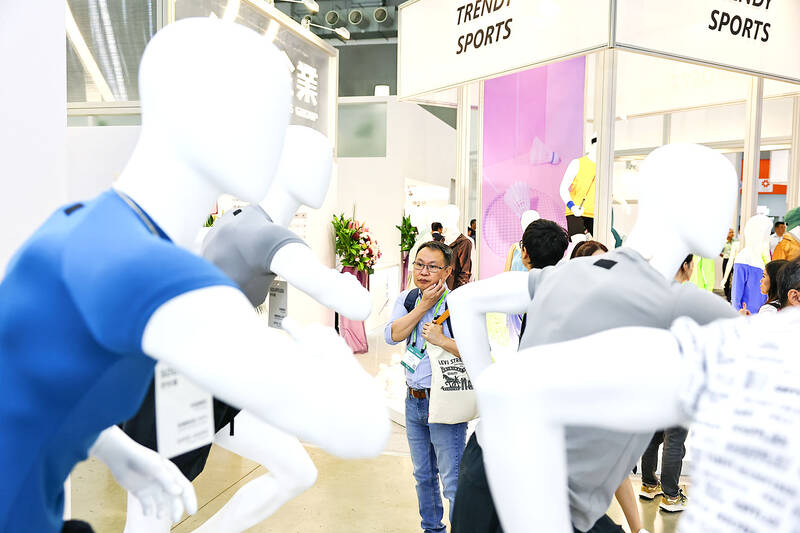The Taipei Innovative Textile Application Show, a sourcing hub for innovative textiles, began at the Taipei Nangang Exhibition Center yesterday with ecofriendly and functional fabrics on display.
Vice President Hsiao Bi-khim (蕭美琴) spoke at the opening ceremony before spending an hour visiting booths set up by domestic exhibitors.
Hsiao said she was pleased to be a spokeswoman for Taiwan’s textiles, given that the industry was the main driving force of Taiwan’s “economic miracle” over the past few decades.

Photo: CNA
“The chip industry is very important, but we can’t only focus on chips,” she said, adding that old-economy sectors also need the support of government policies and incentives to help tackle issues such as labor shortages and green energy availability.
The vice president described herself as a big fan of Taiwan’s textile and fiber products.
“Many of my suits are made of MIT [Made in Taiwan] functional fabrics,” she said, among them the suit she wore at the inauguration ceremony for her and President William Lai (賴清德) on May 20 and the outfit she was wearing yesterday.
Hsiao’s dress at the inauguration event and the suit she wore at the trade show were made using Eclat Textile Co (儒鴻) functional fabrics, industry sources said.
Among the exhibitors at the three-day show are firms that make low-carbon fabrics, with suppliers including Far Eastern New Century Corp (遠東新世紀), Formosa Plastics Group (台塑集團), Lealea Group (力麗集團), Nan Pao Resins Chemical Co (南寶) and New Fibers Textile Corp (新纖實業) showcasing green fiber and textile products.
Nan Pao Resins Chemical chief executive officer Elic Hsu (許明現) said the focus of the company’s display this year is a special fabric that is sweat-resistant, has a soft feel and is composed of up to 53 percent biomaterial content.
It should enter mass-production next year, Hsu said.
At the opening ceremony, Lealea Group chairman James Kuo (郭紹儀), who is chairman of the Taiwan Textile Federation, the event’s organizer, said that the trade show was one of the most important annual events of the domestic textile industry.
This year, 385 manufacturers are participating, included a record 75 overseas exhibitors, signaling that the event has earned the recognition of international peers, Kuo added.
More than 70 international brands have been invited to participate in private meetings with local manufacturers, and visiting delegations from South Korea, Vietnam, India, France and other countries have also been invited to the show, Kuo said.

Intel Corp chief executive officer Lip-Bu Tan (陳立武) is expected to meet with Taiwanese suppliers next month in conjunction with the opening of the Computex Taipei trade show, supply chain sources said on Monday. The visit, the first for Tan to Taiwan since assuming his new post last month, would be aimed at enhancing Intel’s ties with suppliers in Taiwan as he attempts to help turn around the struggling US chipmaker, the sources said. Tan is to hold a banquet to celebrate Intel’s 40-year presence in Taiwan before Computex opens on May 20 and invite dozens of Taiwanese suppliers to exchange views

Application-specific integrated circuit designer Faraday Technology Corp (智原) yesterday said that although revenue this quarter would decline 30 percent from last quarter, it retained its full-year forecast of revenue growth of 100 percent. The company attributed the quarterly drop to a slowdown in customers’ production of chips using Faraday’s advanced packaging technology. The company is still confident about its revenue growth this year, given its strong “design-win” — or the projects it won to help customers design their chips, Faraday president Steve Wang (王國雍) told an online earnings conference. “The design-win this year is better than we expected. We believe we will win

Chizuko Kimura has become the first female sushi chef in the world to win a Michelin star, fulfilling a promise she made to her dying husband to continue his legacy. The 54-year-old Japanese chef regained the Michelin star her late husband, Shunei Kimura, won three years ago for their Sushi Shunei restaurant in Paris. For Shunei Kimura, the star was a dream come true. However, the joy was short-lived. He died from cancer just three months later in June 2022. He was 65. The following year, the restaurant in the heart of Montmartre lost its star rating. Chizuko Kimura insisted that the new star is still down

While China’s leaders use their economic and political might to fight US President Donald Trump’s trade war “to the end,” its army of social media soldiers are embarking on a more humorous campaign online. Trump’s tariff blitz has seen Washington and Beijing impose eye-watering duties on imports from the other, fanning a standoff between the economic superpowers that has sparked global recession fears and sent markets into a tailspin. Trump says his policy is a response to years of being “ripped off” by other countries and aims to bring manufacturing to the US, forcing companies to employ US workers. However, China’s online warriors